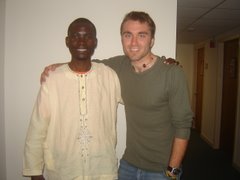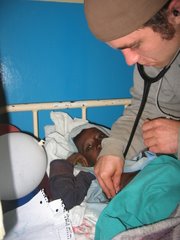Rwanda. I’ll start by addressing the first thing that comes to your mind, because it is the first thing that comes to my mind.
Every day I try to see this country as its own entity, outside the iconic genocide of twelve years past. But by each night I fail. It is impossible to be in Kigali and not see genocide written in mangled fingers of beggars, or in the obvious limp of a passerby. It wakes me up at night so that I cannot fall back asleep, and I lay restless, confused, and lightheaded – psychologically disturbed. It is impossible to understand in the first place how mothers can be made to kill their children, and husbands their wives. What foundation lies beneath this depravity? And in forfeiting this answer, it is then also impossible to figure out how to take in and react to today’s lingering scars.
These marks obviously manifest themselves visibly in the physical mutilation of bodies, but they also show economically and elsewhere. Orphans swarm to sell anything you could ever want (and then all that you would never want), hoping to make a buck – but at least they’re working. Another group just flat out begs. Not just kids, but adults as well. Even elderly. I find this most disturbing – individuals who, after living long lives, don’t have anyone to care for them. And then come stories of homes where kids raise kids – real stories, not just ones we talk about. But to be fair to Rwanda, not everyone is destitute. In fact, there is quite a bit of wealth – nice buildings and business suits to walk in them. The problem is not poverty, but that it exists in wealth’s reach. The ones who have made it worked hard and harnessed some inner strength to get them beyond genocide, the common denominator. But what determines whether or not this strength is accessed?


Two stories.
A girl was raped during the genocide and in the process contracted AIDS. Her aggressor was recently released from prison, so she went to his house to say: “You raped me and it hurt. But I forgive you because if I don’t, I’ll never move on”. Afterwards, a friend questioned whether she had only gone preemptively to dissuade the man from attacking her again. “No,” she said, “Although a Hutu, I imagined he was just as traumatized by the genocide and I wanted to release him from self-hatred. In this way Rwanda will move forward”.
***
At 20, Peter is a thin, quiet man whose clothing delicately drapes his narrow frame. He is tall and lanky, with searching eyes and a hollow face, darker than most, which pokes through like a turtle coming out of its shell. He was 8 years old in 1994 and at home, hiding behind a cabinet, when he watched his father beat for being Tutsi. He lied when the militia found him, saying he didn’t know where his mother was. They never found her under the bed in the room next door. He saved her life. But they beat his father more, then killed him.
Six weeks later, now in April, the president’s plane was shot down and mass killings began. Peter was in a relative’s home seeking shelter when his mother was kidnapped. He never saw her again; three months later heard she was burned with dozens of others in a mass grave.
 Eventually he snuck into a church, which was a little less dangerous. But even there, Tutsis were being taken and tortured at random. He heard rumors of safety in a hotel called The Milles Collines – Hotel Rwanda – just 400 meters up the hill and tried to make the journey but, fearing death, turned back. Soon enough the Red Cross brought food. The UN posted guards, blocking the church’s entrance - and helped move refugees behind RPF lines (Rwandan Patriotic Front – Tutsi expatriates who banned together under the leadership of Paul Kagame, current President, to sweep through Rwanda and end the genocide).
Eventually he snuck into a church, which was a little less dangerous. But even there, Tutsis were being taken and tortured at random. He heard rumors of safety in a hotel called The Milles Collines – Hotel Rwanda – just 400 meters up the hill and tried to make the journey but, fearing death, turned back. Soon enough the Red Cross brought food. The UN posted guards, blocking the church’s entrance - and helped move refugees behind RPF lines (Rwandan Patriotic Front – Tutsi expatriates who banned together under the leadership of Paul Kagame, current President, to sweep through Rwanda and end the genocide). Peter is my roommate, and today we went to the church that hid him. There was a wedding and everyone was happy. He says he’s no longer psychologically disturbed, but every night he listens to a radio talk show about the genocide. This morning he turned it on at 5. People still call in with information about displaced individuals, trying to reconnect family. He’s quiet and keeps to himself, but I like him. We go on walks together and I see genocide from Tutsi eyes.
Peter is my roommate, and today we went to the church that hid him. There was a wedding and everyone was happy. He says he’s no longer psychologically disturbed, but every night he listens to a radio talk show about the genocide. This morning he turned it on at 5. People still call in with information about displaced individuals, trying to reconnect family. He’s quiet and keeps to himself, but I like him. We go on walks together and I see genocide from Tutsi eyes.Like the girl in the first story, and like almost every other Rwandan, he forgives those who wronged him. I cry when I think about this because I’m not capable of doing the same even at a lower level.
Rwanda is a land of bloodshed, true, but it’s also home to the greatest reconciliation story in recent history, and perhaps ever. After genocide, retaliation was on the table, but the people were tired of killing and longed for healing. Rwandese have moved on, and even discarded ethnic distinctions. As an interesting note, because of intermarriage and mixing of the gene pools, there’s little difference between Hutu and Tutsi other than a stamp on a government issued identity card (which is no longer stamped). They are one people working together for one country.



3 comments:
Hey Ben!
Happy New Year! We pray that God continues to be your strength as you wake up each morning. His presence is obvious in your writing, and what joy that is to hear. We are encouraged by your journey, and are anxious to hear more. We love you and pray that God continues to guide your steps each day.
Love,
Brian and Faye :)
Ben,
It is crazy to hear about your experiences! Peter sounds like an awesome guy to learn from. This may sound silly but-- How are you communicating with him? Does he speak English? I love reading what you write. I can't believe he actually was able to take you to Hotel Rwanda! It is interesting that there was a wedding going on. As I read that I kind of thought of it as an example of new life and moving on! It is so nice to hear from you.
Ben it is good to know you are safe. It is amazing that the stories you share allow me to see the world from a new perspective. The last two weeks here in the U.S. have been filled with merryment and whining and a lot of commercialism.Peter's story makes things look different. Please be safe and good to Ben! Luv christine
Post a Comment